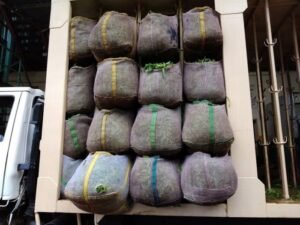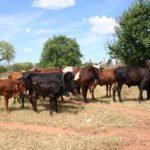By Rootooba Correspondent, 13 June 2020
The Kenya government plans to boost food security in the coming year by reducing the number of food-insecure Kenyans.
This will be done by expanding irrigation schemes, supporting large-scale staples production, increasing access to agricultural inputs, and supporting smallholder farmers in using appropriate farming techniques.
Treasury Cabinet Secretary Ukur Yatani, while reading budget speech in parliament, said the Kenyan economy was currently facing adverse effects of the Covid-19 Pandemic with the economy confronted by the impact of desert locusts and floods that have caused deaths and displacement of people.
Out of the total expenditure of Ksh 2.7 trillion for the country, Yattani allocated Kshs 52.8 Billion to enhance food and nutrition security to all Kenyans in the next financial year 2020/21.
“The allocation to agriculture will be used to promote the use of appropriate farming techniques, set up irrigation projects, and build dams as the government remains committed to reducing food insecurity,” he said.
Yatani further said that out of the Ksh 52.8 billion set, Ksh 10.6 billion had been proposed for the Kenya Climate Smart Agricultural Project, Ksh 5.5 billion for the National Agricultural and Rural Inclusivity Project and Ksh 4.1 billion for the Kenya Cereal Enhancement Programme.
He further broke down the figure saying the food security and crop diversification project will require Ksh 730 million while Ksh 10 billion will be for irrigation land reclamation.
Other proposed allocations in the agricultural sector include Ksh 1.8 billion to enhance aquaculture business development, Ksh 1.4 billion to support small-scale irrigation, and value addition, Ksh 1.3 billion to strengthen the resilience of pastoral communities and Ksh 1.1 billion to enhance drought resilience and sustainable livelihoods.
“We are proposing Ksh 1.6 billion to support processing and registration of title deeds and Ksh 500 million to advance agricultural loans through the Agricultural Finance Corporation”, the CS said.
To address the negative impact of floods & the locust invasion, the Government has been providing
food and non-food necessities to the affected families, relocating affected families to higher grounds and public schools and deploying significant resources to fight locusts through aerial spraying for flying swarms and ground spraying for the hatched ones.
A month ago, President Uhuru unveiled an eight-point economic stimulus package for Covid-19 response and allocations have been made for initiatives such as Ksh 3 billion for provision of subsidized supply of farm inputs through the E-Voucher System to about 200,000 small scale farmers to ensure adequate food supply and cushion farmers from the adverse effects of weather and further secure food supply chains.
Besides, Ksh 1.5 billion will provide temporary support to enable horticultural farmer’s access the international markets.
during this period when the country is experiencing low cargo traffic in and out of the country and Ksh 0.5 Billion to enhance working capital for the Kenya Meat Commission to support livestock farmer.
“All these interventions will support and sustain the farming communities as they employ thousands of workers in our agricultural sector,” Yatani said.
The global outbreak and the rapid spread of the Covid-19 Pandemic have led to the contraction of the global economy. Kenya is not exceptional, and the Pandemic and the swift containment measures, including the closure of the airspace and borders, curfews, and cessation of movements in some counties, have not only disrupted the ways of lives and livelihoods but to a higher extent business.







